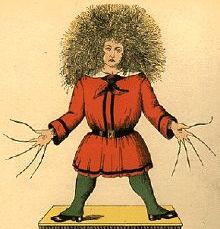Struwwelpeter
|
|
Struwwelpeter is a popular German children's book by Heinrich Hoffmann.
 Struwwelpeter |
Struwwelpeter (slovenly Peter), is an illustrated collection of stories intended for children. The stories include: "Struwwelpeter", "Die Geschichte vom bösen Friederich" (The Story of Cruel Frederick), "Die gar traurige Geschichte mit dem Feuerzeug" (The Dreadful Story of Pauline and the Matches), "Die Geschichte von den schwarzen Buben" (The Story of the Inky Boys), "Die Geschichte von dem wilden Jäger" (The Story of the Wild Huntsman), "Die Geschichte vom Daumenlutscher" (The Story of Little Suck-a-Thumb), "Die Geschichte vom Suppen-Kaspar" (The Story of Augustus who not have any Soup), "Die Geschichte vom Zappel-Philipp" (The Story of Fidgety Philip), "Die Geschichte von Hans Guck-in-die-Luft" (The Story of Johnny Look-in-the-Air), "Die Geschichte vom fliegenden Robert" (The Story of Flying Robert).
Hoffmann, a Frankfurt physician, wanted to buy a picture book for his son for Christmas in 1844. Not impressed by what the stores had to offer, he instead bought a notebook and wrote his own stories and pictures. Hoffmann was persuaded by friends to anonymously publish the book as Lustige Geschichten und drollige Bilder mit 15 schön kolorirten Tafeln für Kinder von 3-6 Jahren in 1845. It wasn't until the third edition in 1858 that the book was published under the title "Struwwelpeter". The first English translation appeared in 1848.
While Struwwelpeter is somewhat notorious for its perceived brutal treatment of the erring children, it has been influential on many later childrens books, most notably Charlie and the Chocolate Factory; in German, Max und Moritz bears a strong resemblance in style to Struwwelpeter. Struwwelpeter has been translated into several languages, including one English translation by Mark Twain, as well as made into many spin-offs and even transformed into propaganda. Unfortunately, because it is a childrens book and therefore not often taken seriously, and because it is written as poetry, most English translations are unsatisfactory in one respect or another.
Shockheaded Peter - A Junk Opera
Shockheaded Peter is a musical entertainment based on Struwwelpeter, combining elements of pantomime and puppetry with musical versions of the poems. Generally, the songs closely follow the text of the poems, but there are significant differences, tending towards giving the songs a much darker tone than the poems. Whereas the children in the poems only sometimes die, in the musical they all do. Fidgety Phil ends up being stabbed to death by the cutlery he throws into the air, and the bullyboys don't get dipped in black ink, instead they get their heads cut off. This makes the musical a much darker entertainment than the original book, and somewhat disturbing to younger children, but undoubtedly contributed to its huge popularity with adults.
Another difference between the book and the musical is the essentially mimed play concerning the parents of Struwwelpeter. Instead of simply being a dirty boy, Struwwelpeter is a monster of sorts, arriving as a baby brought by a stork and already sporting talon-like nails and hideous hair. In disgust, his parents eventually bury him under the floorboards of their home, where his sinister scratching eventually drives his mother to madness and his father to drink. Segments of this play are interspersed with the musical numbers, providing an element of linear plot development lacking from the songs themselves.
The show debuted in 1998 at the Hammersmith Lyric, later appearing in London's West End and in the US. Originally, the show featured the Tiger Lillies, an English cabaret act best known for their eccentric musical style and the falsetto voice of the lead singer Martyn Jaques, and they have a CD featuring the songs from Shockheaded Peter [1] (http://www.tigerlillies.com/). In 2002 the Tiger Lillies were replaced with David Thomas and Two Pale Boys.
